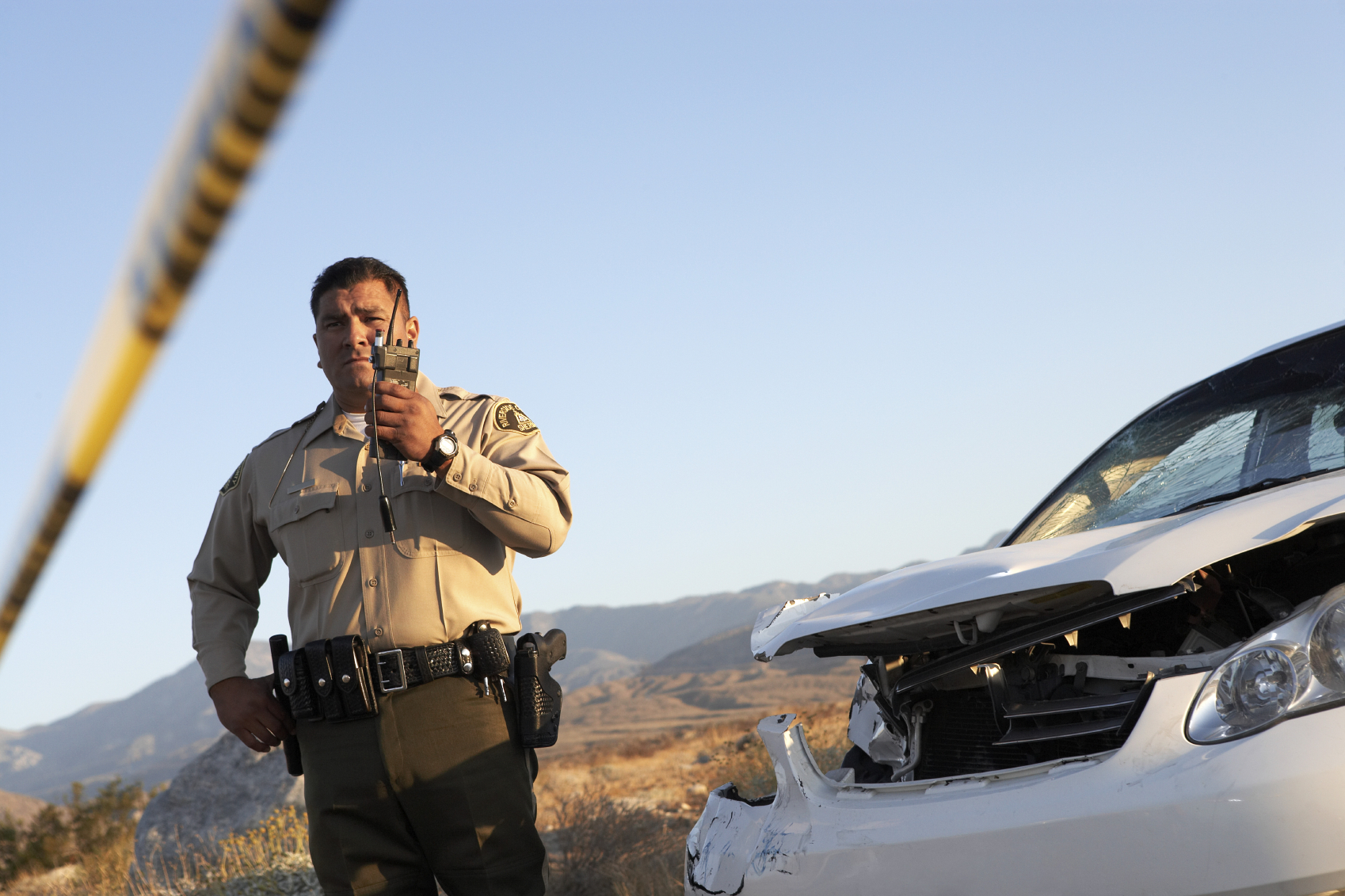
At NerdWallet, we adhere to strict standards of editorial integrity to help you make decisions with confidence. Many or all of the products featured here are from our partners. Here’s how we make money.
If another driver causes an accident, you would generally make a claim against that person’s auto insurance for your injuries, except in no-fault states, and car damage. Crashes you cause are another story. Your insurance company may have to pay for damage and injuries you caused others. Your rates will typically go up at renewal time as a result.
Meanwhile, if you have a speeding ticket on your record, you might be considered a risky driver and also face a rate increase.
NerdWallet analyzed quotes nationwide for drivers with one at-fault crash to show how much more these folks pay on average than customers with clean driving records. See how your state fares:
| National ranking (smallest to biggest price increase) | State | Average annual rate increase compared to drivers with clean records |
|---|---|---|
| 1 | New York | $80 |
| 2 | Connecticut | $147 |
| 3 | Tennessee | $153 |
| 4 | New Hampshire | $157 |
| 5 | Indiana | $190 |
| 6 | Nebraska | $200 |
| 7 | Georgia | $222 |
| 8 | Maine | $272 |
| 9 (tie) | North Dakota | $277 |
| 9 (tie) | Pennsylvania | $277 |
| 11 | Minnesota | $283 |
| 12 | Ohio | $294 |
| 13 | Vermont | $295 |
| 14 | Kansas | $299 |
| 15 | Delaware | $308 |
| 16 | Mississippi | $319 |
| 17 | Washington | $322 |
| 18 | Missouri | $328 |
| 19 | Hawaii | $334 |
| 20 | West Virginia | $339 |
| 21 | Illinois | $340 |
| 22 | Wisconsin | $351 |
| 23 | South Dakota | $355 |
| 24 | Rhode Island | $356 |
| 25 | Idaho | $363 |
| 26 | Colorado | $368 |
| 27 | Alabama | $397 |
| 28 | Virginia | $406 |
| 29 | Oklahoma | $410 |
| 30 | Iowa | $420 |
| 31 | Utah | $422 |
| 32 | South Carolina | $425 |
| 33 | Maryland | $452 |
| 34 | Wyoming | $480 |
| 35 | Montana | $492 |
| 36 | North Carolina | $500 |
| 37 | Arkansas | $510 |
| 38 | Massachusetts | $566 |
| 39 | Texas | $586 |
| 40 | Oregon | $606 |
| 41 | California | $608 |
| 42 | Louisiana | $684 |
| 43 | Alaska | $687 |
| 44 | New Mexico | $759 |
| 45 | Nevada | $808 |
| 46 | Michigan | $810 |
| 47 | New Jersey | $835 |
| 48 | Florida | $843 |
| 49 | Arizona | $865 |
| 50 | Kentucky | $893 |
| 51 | District of Columbia | $1,041 |
| Average increase by state | $446 | |
Cheapest car insurance if you’ve caused a crash: State Farm
If you have an at-fault crash on your record, it’s wise to shop around. Getting several quotes will help you weed out sky-high estimates and find more competitive rates.
We looked at quotes from the four largest auto insurers in the 12 most populous states to find out how the big-name companies stack up.
| Company | Average annual rate increase compared to drivers with clean records |
|---|---|
| Note: Geico rates not available in two states we analyzed. | |
| State Farm |
$755 |
| Geico |
$842 |
| Allstate |
$1,150 |
| Progressive |
$1,277 |
State Farm was the cheapest option in our analysis. On average, the company charged $755 more per year for drivers with an at-fault crash than those with clean records.
Rate increases after a speeding ticket
To give you an idea of how much more you’ll pay if you’re caught speeding, NerdWallet looked at quotes in the five most populous states for drivers with no violations on record, and compared those with rates for drivers with a speeding ticket for going 6 to 10 mph over the limit.
| Ranking (smallest to biggest price increase) | State | Average annual rate increase compared to drivers with no violations |
|---|---|---|
| 1 | Illinois | $54 |
| 2 | New York | $159 |
| 3 | Texas | $175 |
| 4 | California | $353 |
| 5 | Florida | $617 |
Rates may skew even higher for more severe speeding or if it’s a repeat offense.
As with at-fault crashes, speeding tickets trigger different rate increases depending on the company. That’s why it pays to shop around and compare car insurance quotes no matter what your driving record looks like.
How long accidents and speeding tickets stay on your record
Car insurance shoppers may wonder how long they’ll face higher quotes due to past driving mistakes. It all depends on the mistake.
When it comes to accidents, most insurers look back three to five years when setting rates.
Speeding tickets and other mild to moderate violations typically remain on your record for one to three years. In many cases, you can intervene and get violations cleared, especially minor ones, before they hit your record. Serious offenses such as DUIs or reckless-driving convictions can linger for 10 years or more.

Get your free credit score
- Get your score every week at no cost.
- Set goals and see your progress.
- Signing up won’t affect your score.
Get your free score
Alternative car insurance for high-risk drivers
If you have multiple accidents, DUIs or other serious marks on your record, it could be hard to get car insurance on what’s called the “voluntary market.”
If no one will sell you a policy, you may need to look for a state-run assigned-risk plan. Check out the industry organization AIPSO for help finding an assigned-risk plan where you live, or ask your car insurance agent for help.
Methodology
METHODOLOGY
To rank states for rate increases after at-fault crashes: NerdWallet averaged the three lowest quotes in every state using 10 ZIP codes per state. We first ran rates for 30-year-old men and women with no accidents on record and carrying 100/300/50 liability insurance limits, 100/300 uninsured motorist coverage limits, collision and comprehensive with a $1,000 deductible, and other minimum amounts of state-required coverage where needed. We then gathered quotes for the same drivers with one at-fault crash and compared the difference in rates.
To rank the largest companies for rate increases after at-fault crashes: We first gathered each company’s average quote in the 12 most populous states for 30-year-old men and women with clean records. Drivers carried 100/300/50 liability insurance limits, 100/300 uninsured motorist coverage limits, collision and comprehensive with a $1,000 deductible, and other minimum amounts of state-required coverage where needed. We then collected each company’s rate for drivers with an at-fault crash and compared the difference in prices.
To rank states for rate increases after a speeding ticket: We averaged the three lowest quotes in the five most populous states using 10 ZIP codes per state. We first collected rates for 30-year-old men and women with no moving violations and with 100/300/50 liability insurance limits, 100/300 uninsured motorist coverage limits, collision and comprehensive with a $1,000 deductible, and other minimum amounts of state-required coverage where needed. We then gathered quotes for drivers with one speeding ticket for going 6 to 10 mph over the limit and compared the difference in rates.
We used a 2013 Toyota Camry in all cases. These are sample rates generated through Quadrant Information Services. Your rates will be different.
What’s next?
- Want to take action?
Compare car insurance quotes
- Want to dive deeper?
Read more about getting your driving record cleared
- Want to explore related?
Find out who offers the cheapest car insurance








